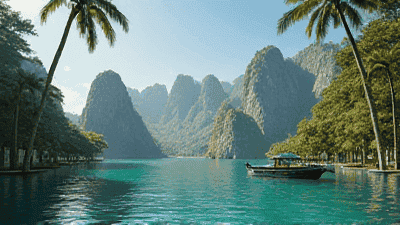
Your Next Thrill Ride: How Travel Becomes the Ultimate Entertainment Escape
Introduction
Travel, once primarily defined by sightseeing and relaxation, is rapidly evolving into a dynamic, immersive entertainment escape. This transformation challenges traditional notions of leisure, positing that the true thrill lies not just in visiting new places, but in actively engaging with experiences that stimulate, challenge, and deeply entertain. It's a fundamental shift from passive observation to active participation, making every journey a personalized adventure, where the traveler is both audience and protagonist in their own unfolding story.
The burgeoning convergence of travel and entertainment reflects a societal yearning for richer, more profound leisure experiences. This shift holds immense value for the tourism industry, prompting innovative offerings like adventure tourism, experiential stays, and themed excursions that cater to diverse entertainment palettes. From virtual reality travel simulations shaping pre-trip excitement to personalized AI-driven itinerary crafting, technology amplifies this trend, creating seamless and engaging pathways to discovery. However, debates persist regarding authenticity versus commercialization, and the sustainability of high-impact entertainment travel. Understanding travel as a sophisticated entertainment form is crucial for developing sustainable models and meeting evolving consumer demands, ensuring the industry remains vibrant and relevant. What impact would it have on our understanding or practice of leisure and hospitality if we failed to fully comprehend how travel is becoming the ultimate entertainment escape?
The Evolution of Experiential Travel

Beyond Postcards: Journeying into Active Entertainment
The shift from traditional tourism to travel as entertainment is fundamentally about moving beyond mere sightseeing to embracing active engagement, transforming journeys into deeply personal, immersive experiences. This isn't just about visiting a destination; it's about doing in that destination. The core mechanism is the traveler's active participation, replacing passive observation with hands-on activities, cultural immersion, and adventure. For instance, instead of merely admiring a landscape, an adventure traveler might engage in white-water rafting through its canyons or trek its mountain passes. This principle taps into the human psychological need for novelty, challenge, and personal growth, where the experience itself becomes the primary reward. Take the example of a culinary tour in Italy: travelers aren't just eating local food; they're learning to prepare it in a local’s home, sourcing ingredients from regional markets, and understanding the cultural significance behind each dish. This level of engagement provides a more profound sense of accomplishment and connection than simply dining out. Similarly, studies in positive psychology highlight the dopamine release associated with novel and challenging experiences, fueling the desire for this type of travel. Travel, in this context, becomes a personal stage where you are simultaneously the audience, the director, and the lead performer.
Fueling Economies, Enriching Lives
Economic Impetus and Personal Transformation
The ascent of travel as entertainment has profound, multifaceted impacts, significantly boosting local economies while simultaneously enriching individual lives through cultural immersion and skill development. Economically, this trend stimulates job creation in specialized sectors like adventure guiding, culinary instruction, and bespoke tour operation, often in regions that historically saw limited tourism. It funnels revenue directly into local communities, supporting small businesses, artisans, and fostering infrastructure development tailored to unique experiences. For example, the growth of voluntourism or eco-tourism initiatives in regions like Costa Rica not only attracts visitors seeking meaningful engagement but also funds conservation efforts and local community projects.
Beyond economics, the personal transformations derived from these journeys are immense. Travelers often return with enhanced cultural understanding, new skills (e.g., learning a craft, mastering a new sport), and a broadened perspective, contributing to global empathy and personal growth. The challenge of a summit climb, the nuance of a language exchange, or the reward of contributing to a conservation project fundamentally alters perceptions and builds resilience.
Consider the growth of niche travel segments that exemplify this trend:
| Travel Segment | 2020 Market Share (%) | 2023 Market Share (%) | Projected 2027 Growth Rate (%) |
|---|---|---|---|
| Adventure Tourism | 15.2% | 18.5% | 8.9% |
| Experiential & Cultural | 22.8% | 26.1% | 7.5% |
| Wellness & Retreat | 11.5% | 13.0% | 6.2% |
This data illustrates a clear shift in consumer preference towards travel types that prioritize active engagement and personal enrichment. The sustained growth in Adventure and Experiential categories, even amidst global disruptions, underscores the inherent value travelers place on these transformative entertainment experiences. It’s a testament to how these journeys aren't merely leisure but investments in personal development and global understanding, driving both economic vitality and individual well-being.
The Future Frontier of Travel

Navigating Innovation and Sustainability
The future of travel as entertainment promises an exhilarating blend of cutting-edge innovation and a critical focus on sustainability. We are entering an era of hyper-personalization, where artificial intelligence (AI) and big data will craft bespoke itineraries that anticipate and fulfill individual desires, moving beyond generic packages to truly unique adventures. Imagine AI curating a trip based on your learning style, preferred challenge level, and even your mood. Virtual reality (VR) and augmented reality (AR) are poised to redefine pre-travel planning and on-site immersion, offering "try before you buy" experiences or overlaying historical context onto ancient ruins. While still nascent, the concept of space tourism exemplifies the ultimate entertainment escape, pushing the boundaries of human experience.
However, these innovations bring significant challenges. Overtourism, environmental degradation from increased foot traffic and carbon emissions, and the potential erosion of local culture through commercialization demand urgent attention. The industry's evolution must be guided by principles of regenerative travel, aiming to leave destinations better than they were found. Sustainable practices, such as supporting local, eco-friendly businesses, minimizing waste, and investing in renewable energy for transportation and accommodation, are no longer optional but imperative. Travel, much like an evolving tapestry, will constantly be rewoven with new threads of technology and ethical considerations, ensuring its thrill doesn't come at an unsustainable cost.
Conclusion
This article has explored how travel has transcended its traditional boundaries, emerging as a sophisticated and deeply personal form of entertainment escape. We've delved into the mechanisms driving this evolution, from the psychological allure of novelty and challenge to the profound economic and social impacts generated by experiential journeys. The core finding is that modern travelers seek not just destinations, but transformative narratives where they are active protagonists, seeking engagement over mere observation. This paradigm shift underscores travel's immense value, not merely as a leisure activity, but as a potent catalyst for personal growth, cultural exchange, and economic vitality. By embracing this perspective, the industry can better anticipate and cater to desires for authentic, engaging, and unforgettable experiences, solidifying travel's position as an indispensable component of contemporary life's entertainment landscape and a powerful engine for global connectivity.
Looking ahead, the trajectory of travel as entertainment points towards hyper-personalization, driven by advanced AI and data analytics, crafting bespoke itineraries that resonate deeply with individual interests. Breakthroughs in virtual and augmented reality will blur the lines between planning and experiencing, offering immersive previews and enriching on-site interactions. However, significant challenges remain, including mitigating the environmental impact of increased travel, addressing overtourism, and ensuring equitable access to these enriching experiences. Macro scientific policies emphasizing sustainable development and ethical tourism will be crucial in guiding this evolution. Interdisciplinary integration, blending psychology, technology, and cultural studies, will continue to innovate the ways we conceive and execute travel. Continuous research into traveler motivations and the long-term impacts of experiential journeys is vital to responsibly shape this evolving landscape, ensuring travel remains a source of joy, discovery, and sustainable entertainment for generations to come.
Frequently Asked Questions (FAQ)

Q: What exactly distinguishes 'travel as entertainment' from traditional tourism? A: The core distinction lies in the traveler's role and the primary objective of the journey. Traditional tourism often involves passive observation, like visiting landmarks, taking guided bus tours, or relaxing on a beach, where the traveler is largely an observer. The focus is on seeing and relaxing. In contrast, 'travel as entertainment' emphasizes active participation, immersion, and personal transformation. Here, the traveler is an active participant, seeking experiences that challenge, teach, or profoundly engage them. For instance, instead of merely viewing the Great Barrier Reef, an entertainment-focused traveler might take a scuba diving course to explore it firsthand, or participate in a marine conservation project. The goal shifts from merely experiencing a place to actively interacting with it, learning from it, and even contributing to it. It’s about creating a personal narrative and collecting unique memories through a journey designed to stimulate and entertain in a deeper, more personal way, often involving adventure, cultural deep-dives, or skill acquisition.
Q: How can travelers ensure their entertainment-focused journeys are also sustainable and responsible? A: Ensuring entertainment-focused journeys are sustainable and responsible requires conscious choices and proactive planning. First, prioritize operators and accommodations that explicitly commit to ethical practices, such as eco-certifications, fair labor practices, and community-based tourism initiatives that directly benefit local populations. Second, minimize your environmental footprint by opting for public transportation, walking, or cycling whenever possible, choosing direct flights to reduce emissions, and reducing waste by carrying reusable water bottles and bags. Third, practice cultural sensitivity by learning basic phrases, dressing appropriately, asking for permission before taking photos, and respecting local customs and traditions. Avoid activities that exploit local people, wildlife, or the environment, such as elephant riding or unregulated animal interactions. Support local economies by purchasing goods and services directly from local artisans and businesses, rather than international chains. Finally, consider regenerative tourism, which aims to leave a destination better than you found it, perhaps through volunteering with conservation projects or participating in clean-up efforts. Responsible travel transforms your journey from just an escape into a meaningful contribution.








